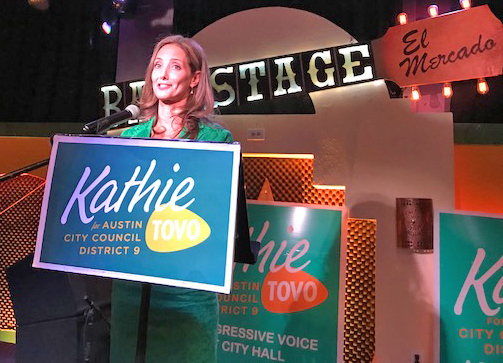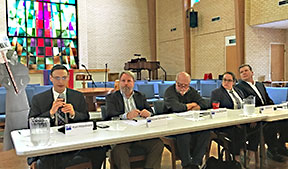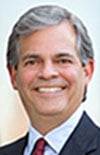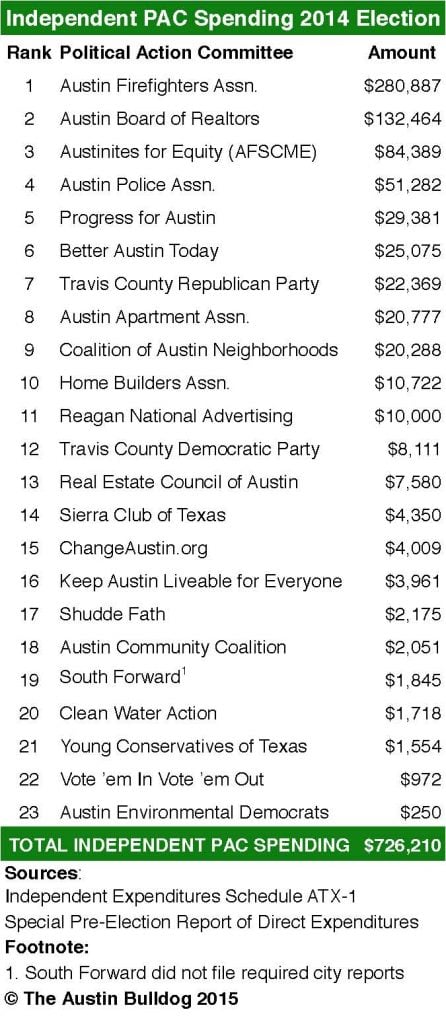Elections
Profile: Doug Greco for mayor
First-ever opportunity to elect appraisal board members
They’re off and running for council
Tovo Shoots for Third Term
Tovo Shoots for Third Term
Same place, same packed house as her
2014 campaign but with no opponent…yet
By Ken Martin
© The Austin Bulldog 2018
Posted Sunday February 18, 2018 8:02pm
 A raucously enthusiastic crowd greeted Mayor Pro Tem Kathie Tovo’s official announcement February 8, 2018, that she would seek a third term as the District 9 council member.
A raucously enthusiastic crowd greeted Mayor Pro Tem Kathie Tovo’s official announcement February 8, 2018, that she would seek a third term as the District 9 council member.
 “It has really been an honor and a privilege to serve as mayor pro tem and to represent City Council District 9 on the Austin City Council and I want to say, you know I have a very unique experience of serving on the last at-large council and [then] and being [on the] first female-majority council in Austin’s history.”
“It has really been an honor and a privilege to serve as mayor pro tem and to represent City Council District 9 on the Austin City Council and I want to say, you know I have a very unique experience of serving on the last at-large council and [then] and being [on the] first female-majority council in Austin’s history.”
District 9 is at the very center of the city, stretching from Oltorf and St. Edwards Drive in South Austin to 53rd Street in North Austin, with doglegs to take in parts of North Loop and Delray. Parts of the district stretch as far west as MoPac Expressway and as far east as Manor Road. Austin’s City Hall and the west side of the University of Texas campus fall within District 9 while the Capitol and the east side of the UT campus are jigsawed out to fall within District 1.
In the crowd to support Tovo were Council Members Ann Kitchen and Leslie Poole, former Council Member (and now mayoral candidate) Laura Morrison, and District 8 candidate Bobby Levinski, a former Tovo staffer.
Tax Dollars for Council Campaigns?
Experts Discuss Money in Politics
Experts Discuss Money in Politics
Diverse views on the effects of campaign finance,
the current state of regulation, and action needed
by Ken Martin
© The Austin Bulldog 2015
Posted Tuesday, November 17, 2015 10:04am
“The League of Women Voters of the United States believes that the methods of financing political campaigns should ensure the public's right to know, combat corruption and undue influence, enable candidates to compete more equitably for public office and allow maximum citizen participation in the political process....”
—League of Women Voters National Board
 The League of Women Voters Austin Area brought the League’s national study on Money in Politics into local focus with a Sunday afternoon panel discussion. A more politically diverse panel of five speakers would be difficult to imagine. The audience of nearly 50 people paid close attention and posed a number of questions for the panelists.
The League of Women Voters Austin Area brought the League’s national study on Money in Politics into local focus with a Sunday afternoon panel discussion. A more politically diverse panel of five speakers would be difficult to imagine. The audience of nearly 50 people paid close attention and posed a number of questions for the panelists.
Kurt Hildebrand, chair of the Libertarian Party of Texas, said his party has taken no position on campaign finance or on money in politics, as the views of Libertarians encompass a broad range. Some believe there should be tight regulations and some believe there should be no regulation at all, he said.
“We want people to be as free as they possibly can be with equality, justice, and equal protection under the law.”
Part 2: The $6.3 Million Election
Part 2: The $6.3 Million Election
Winners took office carrying almost $600,000 in debt,
while 34 defeated must raise or lose nearly $500,000
by Ken Martin
© The Austin Bulldog 2015
Part 2 in a Series
Posted Monday April 6, 2015 9:39am
Updated Tuesday April 7, 2015 8:56am
“Many people are in the dark when it comes to money,
and I’m going to turn on the lights. — Suze Orman
Who could have imagined that the scramble for 11 spanking new political posts to oversee a new form of governance for the City of Austin would unleash a torrent of political spending, the likes of which Austin had never seen?
Or—perhaps even more startling—that 43 of the competing candidates collectively would pour $1.3 million of their own money into the quest?
These staggering totals captured The Austin Bulldog’s attention and prompted an extensive examination. This entailed reviewing campaign finance reports filed by all 78 candidates, covering all five reporting cycles, from July 2014 through January 2015. Our examination also sorted out the full particulars for the $1.3 million that the candidates loaned to their campaigns or spent outright in hopes of reimbursement.
For you who wonder who spent how much to win or lose a place on the council dais, this one’s for you. You’re invited to follow me, the guy with the flashlight, as we jump down the rabbit hole of campaign finance as it was utilized in the one-off election of 2014.
 You already know Steve Adler won election in 2014 and buried chief opponent Mike Martinez with a landslide mayoral runoff margin of 67-33 percent. Adler also set all-time records by spending more than $1.5 million on his campaign, of which more than $387,000 came out of his own deep, deep pockets.
You already know Steve Adler won election in 2014 and buried chief opponent Mike Martinez with a landslide mayoral runoff margin of 67-33 percent. Adler also set all-time records by spending more than $1.5 million on his campaign, of which more than $387,000 came out of his own deep, deep pockets.
In round figures the 78 candidates, including Adler, spent $5.6 million campaigning. Political action committees (PACs) dished out $726,000 in direct expenditures to bring total spending to an astronomical, for Austin, $6.3 million. (PAC spending was detailed in Part 1 of this series published March 27.)
While money is an important tool for an otherwise viable candidate who spends it effectively, the best funded candidates did not win all the council districts. Did they misspend? Did they flub it on the campaign trail? Only the voters know for sure. But, money be damned, the fact is, four of the 10 winning district candidates were outspent by their opponents—some only by little, some by huge amounts.
These results seem to bear out an essential truth about political contests: you don’t absolutely need more money than your opponent, but you do need enough to run a viable campaign.
For those who like to swim through deeply detailed spreadsheets, take a deep breath and dive into the Campaign Finance Analiysis for 2014 Election of Mayor and Council Candidates. This compilation lays out the contributions, expenditures, loans, and cash on hand for each of the 78 candidates, through all five reporting cycles, and provides totals for each race. And for good measure the analysis delves into the loans, loans recouped, and PAC spending.
If you’re not doing the deep dive that’s fine. Just hang on, read the rest, and check out the handy charts that capture important highlights.
Campaign savvy beats cash, sometimes
10-1 Elections Cost $6.3 Million
10-1 Elections Cost $6.3 Million
Political action committees laid out $726,000
for independent expenditures to influence voters
by Ken Martin
© 2015 The Austin Bulldog
Part 1 in a Series
Posted Friday March 27, 2015 1:59pm
“Money doesn't talk, it swears.” — Bob Dylan
 The chief poet of rock ’n’ roll might have been talking about the use of money in politics when at age 24 he sang these words in one of the songs on his 1965 album, ”Bringing It All Back Home”
The chief poet of rock ’n’ roll might have been talking about the use of money in politics when at age 24 he sang these words in one of the songs on his 1965 album, ”Bringing It All Back Home”
Twenty-three local political action committees (PACs) certainly believed, or at least hoped, that spending $726,210 would influence Austin voters to elect—or not elect—certain candidates for mayor and City Council.
When the money spent by these independent PACs is combined with funds spent by the candidates themselves it all adds up to an eye-popping grand total of $6,298,059.
Independent expenditures in Texas law are known as “direct campaign expenditures” made without the prior consent or approval of the candidate who benefited. They are not counted as contributions to the candidate.
The Austin Bulldog reviewed the direct expenditures in every report the 23 PACs filed and recorded them in a spreadsheet. The direct expenditures funded by PACs paid for a wide variety of goods and services including consultants, advertisements, printed mail pieces and the postage to send them, for door hangers, campaign signs, canvassers, phone banks, and block walkers.
The big picture







